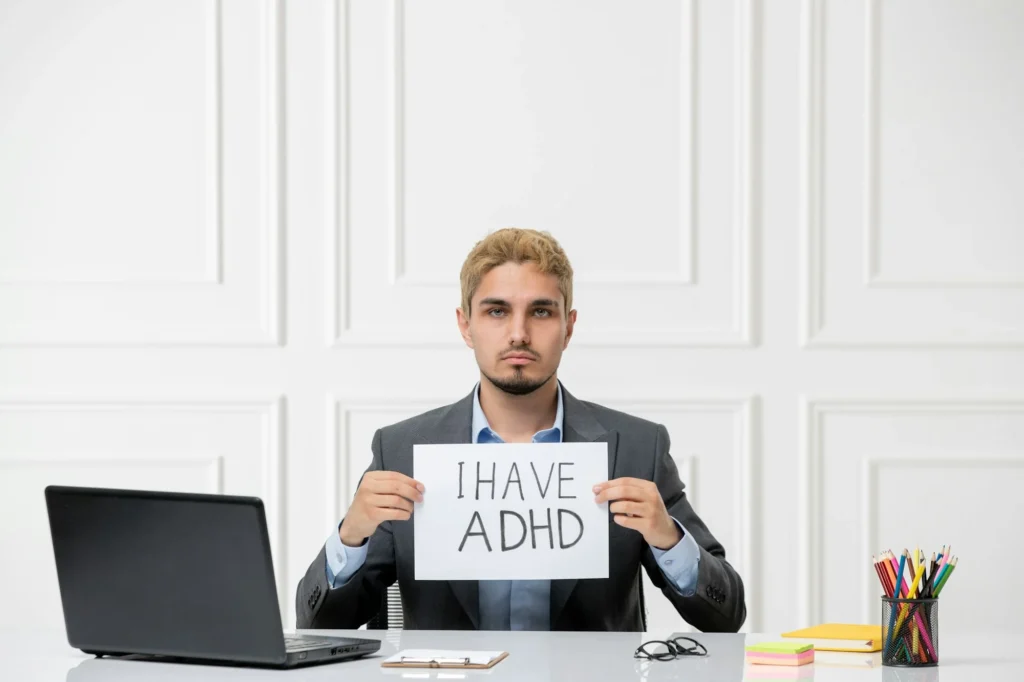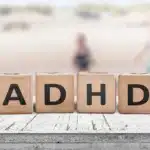Approximately 7 million people in the United States have been diagnosed with attention deficit hyperactivity disorder (ADHD). This common disorder often co-occurs with substance abuse, making a personalized treatment plan beneficial for healing.
Whether you struggle with childhood ADHD or adult ADHD, understanding the risk factors of addiction can aid in prevention. Those who are already dealing with a dual diagnosis can move forward with addiction treatment. Specialized treatment programs address both drug addiction and ADHD.

What is ADHD?
Attention deficit hyperactivity disorder (ADHD) is a common neurodevelopmental disorder that is typically diagnosed in childhood but often lasts throughout a person’s life. This condition is recognized in the Diagnostic and Statistical Manual of Mental Disorders, Fifth edition (DSM-5) because it does affect how a child’s brain develops and progresses. It is considered one of the various psychological disorders, but the condition can be managed with proper treatment.
What are the Symptoms of ADHD?
ADHD symptoms can mimic normal childhood behaviors, such as impulsive behavior or hyperactivity. For it to be classified as ADHD, the symptoms must be severe enough to impact and disrupt the child’s everyday life.
Some of the symptoms are as follows:
Addiction consists of an intense and persistent urge to use a substance or engage in a behavior that provides a reward, even though it also causes substantial harm and negative consequences. In order to classify substance use as an addiction, it must meet the criteria of the DSM-5 definition below:
- Impulsivity.
- Behavior problems (at home or in school).
- Struggle to focus due to daydreaming.
- Distractable.
- Fidgets constantly and/or difficulty sitting still.
- Interrupts others who are talking.
- Tunes out what people are saying or doesn’t seem to hear what you say.
- Difficulty waiting their turn.
- Disorganized.
- Forgetful.
- Poor academic performance due to difficulty concentrating.

What is Addiction?
Addiction consists of an intense and persistent urge to use a substance or engage in a behavior that provides a reward, even though it also causes substantial harm and negative consequences. In order to classify substance use as an addiction, it must meet the criteria of the DSM-5 definition below:
- Use of substance is becoming harmful to person using it.
- Leads to interpersonal problems.
- Causes person to neglect major life roles.
- Leads to legal problems.
- Withdrawal occurs if the substance is stopped.
- Tolerance to the substance occurs.
- Larger amounts of the substance are needed to get same effect.
- Person has tried quitting the substance several times.
- A lot of time is involved in using or obtaining the substance.
- Substance causes other problems psychically or psychologically.
- Person has given up activities to do the substance.
You must have more than two of the above-listed symptoms for a 12-month period.
What are the Risk Factors for Addiction?
Some people are more at risk of becoming addicted if they start using a substance. The risk factors don’t necessarily cause someone to develop substance use disorder, but using a substance can be riskier for that person. The following are some of the risk factors:
- Environmental.
- Absent or neglectful parents.
- Genetics.
- Peer pressure and limited or no peer pressure refusal
- Early experimentation with drugs.
- Using a drug by smoking or injecting it.
- Poverty.
- Mental health disorders, including ADHD.
- Drug availability.
It’s important to note that a person’s home environment can also be a risk factor. This is pertinent during childhood. If there is a family history of drug use at home, it can affect children. When parents or older family members use drugs in front of a child, it may lead to the child using drugs later on.
How are ADHD and Addiction Related?
People with ADHD may also have co-occurring substance use disorder. In fact, long-term studies reveal a connection between ADHD and addiction. In one study, approximately two-thirds of young people receiving substance abuse treatment were also diagnosed with ADHD. If you are diagnosed with ADHD, there is an additional risk that you will develop substance use disorder.
Is ADHD a Risk Factor for Addiction?
Statistics reveal that 6 to 9 % of children are affected by ADHD. Furthermore, 9 % of adolescents are struggling with a substance use disorder. An overlap between these two conditions may occur. Sometimes, people with ADHD may use substances to cope with their symptoms.
Does ADHD Increase the Risk of Substance Abuse?
There are several factors that put a person at risk for addiction. One of these risks is having a diagnosis of ADHD. As with any risk factor, it does not mean you will necessarily become addicted, but there is a greater likelihood. It’s important to consider all treatment options if you develop a dual diagnosis.

What are the Common Types of Addiction in Individuals with ADHD?
Individuals with ADHD may become addicted to a variety of substances. Some common types of addictions include the following.
1. ADHD and Alcohol Addiction
Alcohol is one of the most prevalent substances abused by young people with ADHD. Alcohol abuse or alcohol dependence can lead to addiction.
2. Stimulant Addiction
People with ADHD can become addicted to stimulant medications like Adderall and Ritalin, which are used in the treatment of ADHD. Other recreational drugs that fall into the stimulant category that people with ADHD may abuse include Cocaine, Crystal meth, MDMA (ecstasy), and Ephedrine.
3. Gambling Addiction
Gambling can create the same type of feel-good chemicals in the brain that drugs do. Addiction occurs when someone engages in repetitive gambling behavior even though they suffer negative consequences.
4. Food Addiction
Experiments show that food can trigger the reward and pleasure center of the brain, just as drugs do. Certain foods can increase dopamine levels in the brain, leading the person to develop a food addiction.
What are the Treatment Options for Individuals with ADHD and Addiction?
Treating both ADHD and substance use disorder in tandem brings about the best outcomes. If you don’t address both conditions together through a dual diagnosis treatment program, it may result in an incomplete recovery effort. One condition can aggravate or lead to the other condition. So, it is necessary to access whatever therapeutic interventions are available, including medications, various therapeutic techniques, and support groups.
1. Medications
ADHD can be treated with both stimulant and non-stimulant medications. One non-stimulant medication approved by the Food and Drug Administration (FDA) is atomoxetine. For individuals who are dealing with substance use disorder, it may be beneficial to avoid stimulant medications due to the risk of addiction to these.
2. Therapy
Behavioral therapy is the main form of treatment for any type of co-occurring disorder, including ADHD and SUD. Cognitive–behavioral therapy (CBT) is one therapeutic approach offered by many treatment providers and one that benefits the participants.
3. Support Groups
Joining a support group can help someone with a dual diagnosis who needs to make more significant progress. Two common types of support groups to accompany treatment include:
- Psychoeducational Groups.
- Skills Development Groups.
How Can ADHD and Addiction Be Prevented?
If you have ADHD, preventing addiction is vital to your well-being. You can seek treatment for mental health disorders such as ADHD. Be sure to work with a treatment provider that offers dual diagnosis programs, addressing both ADHD and substance use disorders.
Frequently Asked Questions About ADHD and Drug Addiction:
Are individuals with ADHD more prone to substance abuse?
Yes, studies have shown that people with ADHD are more likely to misuse substances like alcohol, nicotine, and illicit drugs. Managing ADHD symptoms can be tough. Some people may turn to substances that help them feel better for a short time. However, this can raise the risk of addiction.
Why does ADHD increase the risk of addiction?
The impulsivity associated with ADHD can lead to risky behaviors, including substance use. People with ADHD may use drugs or alcohol to deal with negative feelings or social problems. They might also use these substances to help them focus. However, this can increase their risk of developing an addiction.
Can treating ADHD reduce the risk of addiction?
Effective treatment of ADHD can lower the risk of substance misuse. By managing symptoms through medication, behavioral therapy, or a combination of both, individuals are less likely to seek out substances as a form of self-medication.
Is it safe to use stimulant medications for ADHD in individuals with a history of addiction?
While stimulant medications are effective for treating ADHD, they have the potential for misuse. For individuals with a history of substance abuse, healthcare providers might opt for non-stimulant medications or closely monitor stimulant use to minimize risks.
What non-stimulant medications are available for treating ADHD?
Non-stimulant ADHD medications like atomoxetine (Strattera) and certain antidepressants can effectively manage ADHD symptoms. These medications have a lower risk of abuse and are often considered for individuals with co-occurring substance use disorders.
How does ADHD impact addiction treatment?
ADHD can complicate addiction treatment because untreated ADHD symptoms may hinder recovery efforts. Integrating ADHD management into addiction treatment plans can improve outcomes by addressing underlying issues contributing to substance use.
Can substance abuse worsen ADHD symptoms?
Yes, substance abuse can exacerbate ADHD symptoms. Drugs and alcohol can impair cognitive functions, making it even more challenging to focus, control impulses, and regulate emotions.
Sources:
The Science of Addiction: https://nida.nih.gov/sites/default/files/soa_2014.pdf
The Complicated Relationship: https://www.ncbi.nlm.nih.gov/pmc/articles/PMC4414493/
ADHD and Substance Abuse: https://www.ncbi.nlm.nih.gov/pmc/articles/PMC4097844/
Author
-
Sherrilyn is an experienced mental health writer with a demonstrated history in content marketing. HubSpot inbound marketing certified with skills in SEO, content creation, proofreading, editing, and teaching.
View all posts -
Dr. Williams has held senior leadership positions in the behavioral health field for over 30 years. He has worked with diverse populations in various private and public sectors.
View all posts













